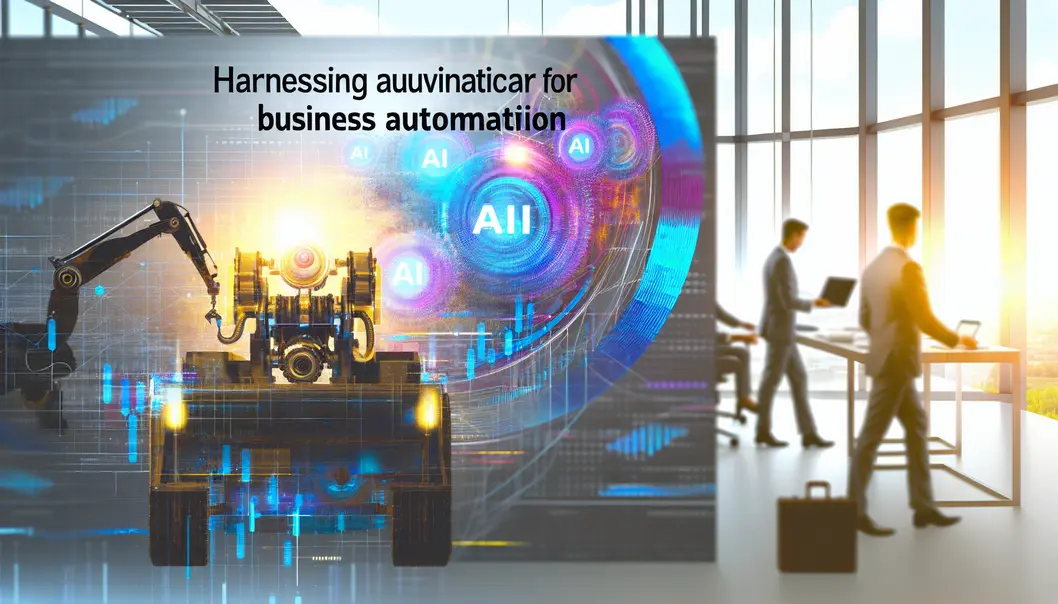
Harnessing AI to Revolutionize Business Automation
Artificial Intelligence is redefining business operations by automating mundane tasks, refining decision-making and elevating customer experiences. This comprehensive look into AI tools unveils how CEOs can harness technology to transform general business operations, enhance data-driven strategies, and improve customer interactions, fostering an environment primed for growth and innovation.
Harnessing AI to Revolutionize Business Automation
Artificial Intelligence (AI) has rapidly emerged as a cornerstone for enhancing business automation across a wide range of industries. The integration of AI tools into business processes allows organizations to unlock unprecedented levels of efficiency and productivity. At the heart of this transformation is the ability of these tools to handle repetitive tasks seamlessly, providing significant relief to human operators and allowing them to focus on tasks that require strategic thinking and creativity.
One of the most impactful applications of AI in business is in enhancing customer service. AI-driven chatbots have become an omnipresent force, offering continuous support without incurring the traditional overhead costs associated with 24/7 human operations. By leveraging natural language processing, these systems can not only understand and respond to customer inquiries with precision but also personalize interactions, thereby enriching the customer experience. This ability to offer tailored responses in real-time ensures that businesses can scale their customer service capabilities without a proportional increase in expenses.
Beyond customer service, AI has revolutionized internal operations through the concept of hyperautomation, which marries AI with robotic process automation and machine learning to automate complex workflows end-to-end. This holistic approach results in profound cost savings and accuracy improvements. In human resources, for instance, AI can automate the initial screening process of recruitment, efficiently sorting through thousands of applications to identify the most promising candidates based on predefined criteria. In supply chain management, AI tools improve logistics by applying predictive analytics to optimize demand forecasting and inventory management, paving the way for reduced delivery times and enhanced operational efficiency.
Another vital aspect of AI’s contribution to business automation is in the realm of data-driven decision-making. AI tools rapidly convert vast datasets into actionable insights, providing real-time visualizations that inform and expedite the decision-making process. Tools offering AI-enhanced dashboards empower decision-makers to respond dynamically to current trends, aiding in quicker and more informed choices compared to reliance on outdated reports.
Moreover, AI’s role in lowering operational costs cannot be overstated. By eliminating manual processing jobs and reallocating human resources to strategic roles, businesses achieve substantial cost reductions. It’s not uncommon for operational expenses to be slashed by over 30% when AI is effectively implemented. This shift not only optimizes the workforce but also facilitates higher workforce morale by enabling employees to abandon monotonous tasks in favor of innovative pursuits that leverage their skills.
In marketing contexts, AI tools deftly assist in tailoring campaigns to consumer analytics, making the processes of lead generation and audience engagement far more efficient and cost-effective. By automating the repetitive and time-consuming aspects of marketing, such as campaign scheduling and adjustment based on live consumer interaction data, businesses find they are able to enhance engagement rates and achieve better returns on marketing investments.
In essence, AI stands as a transformative force in business automation, streamlining operations, boosting productivity, and allowing companies to be more agile, strategic, and competitive. As businesses increasingly embrace AI-powered tools, the landscape of business operations is being redefined, creating a more dynamic and efficient environment powered by technology.
Harnessing AI for Data-Driven Decision Power in Business Automation
In the rapidly evolving landscape of business automation, the integration of artificial intelligence (AI) is empowering organizations to make smarter, more informed decisions. At its core, AI’s ability to process massive data sets and uncover hidden patterns is revolutionizing how businesses approach decision-making. By leveraging these advanced technologies, companies can transform their decision-making frameworks to be more data-driven, objective, and proactive.
One of the standout features of AI in decision-making is its adeptness at analyzing large volumes of both structured and unstructured data. Traditional methods often fall short in identifying intricate patterns within complex data sets, but AI excels in this area by delivering insights that traditional analytics tools might overlook. These insights provide businesses with actionable intelligence that can guide strategic initiatives and improve overall outcomes.
AI’s proficiency in pattern recognition and trend prediction further enhances its value in business automation. Utilizing sophisticated algorithms, AI systems can anticipate market shifts and consumer behavior, enabling businesses to make preemptive moves and stay ahead of their competitors. This predictive capability is crucial, allowing companies to adapt swiftly to changing circumstances and capitalize on emerging opportunities.
Another critical aspect is AI’s role in mitigating human bias in decision-making processes. Human judgment, while valuable, is inherently subjective and prone to bias. AI offers a data-driven, emotion-free approach that ensures decisions are based on empirical evidence. This objectivity enhances the credibility and reliability of business strategies, leading to more equitable and effective outcomes.
AI tools like predictive analytics automate repetitive analytical tasks, thereby freeing up human resources to focus on higher-level strategic planning. This shift not only increases productivity but also allows teams to concentrate on innovation and growth. Moreover, the automation of these mundane tasks ensures consistency and accuracy in process execution, reducing the potential for human error.
As companies continue to integrate AI into their decision-making processes, regular monitoring and refinement are essential. AI systems should be continuously assessed to ensure they align with organizational objectives and deliver the intended benefits. By doing so, businesses can sustain the advantages of AI-driven decision-making, ensuring they remain nimble and competitive.
In conclusion, AI is a transformative force in business automation, particularly in enhancing data-driven decision-making. By embracing these advanced tools, businesses can navigate the complexities of today’s market with precision and confidence, ultimately driving sustained growth and success. For those interested in how AI can democratize specialized skills, check out this resource.
Crafting Proactive Customer Experiences with AI in Business Automation
Artificial Intelligence is revolutionizing the landscape of customer experience (CX) within business automation strategies. Businesses are leveraging AI to provide tailored experiences, respond to customer queries with unprecedented speed, and predict future needs, thereby creating seamless interactions and fostering customer loyalty.
AI-driven personalization enables businesses to understand customer preferences and predict behaviors by analyzing vast datasets. Machine learning algorithms sift through historical purchase data and browsing patterns to recommend products or services that align best with individual customer tastes. This personalization not only increases engagement but also translates into higher conversion rates, fundamentally enhancing the overall customer journey.
Another transformative aspect of AI in customer experience is the automation of customer service. AI-powered chatbots and virtual assistants manage a host of routine tasks, offering 24/7 support. By providing instant responses to common inquiries such as order statuses or account details, these tools reduce wait times significantly. Furthermore, automated ticketing systems categorize and prioritize customer issues efficiently, ensuring swift resolution by directing them to the proper channels without delay.
Predictive analytics, another hallmark of AI’s impact, allows businesses to anticipate customer needs before they become apparent. By examining historical data trends, companies can tailor their services to meet future demands. For example, during peak shopping seasons, AI can predict demand surges, enabling businesses to adjust staffing and inventory levels proactively. This foresight ensures that customer experiences remain smooth and interruptions are minimized.
Sentiment analysis further contributes to the enhancement of customer experience. AI tools dissect customer feedback from varied platforms—social media, forums, and reviews—to understand public sentiment. By analyzing the tone and context of feedback, companies can respond more strategically, mitigating negative perceptions and reinforcing positive experiences.
Moreover, AI enhances knowledge management by providing instantly accessible information to both customers and service agents. Automated knowledge bases improve self-service capabilities, reducing resolution times and increasing overall efficiency. With real-time access to relevant data, service agents report significantly higher performance levels.
In conclusion, artificial intelligence not only automates and streamlines business operations but also plays a crucial role in elevating customer experiences across various touchpoints. As AI continues to evolve, its ability to refine interactions and offer increasingly sophisticated solutions will become indispensable for businesses aiming to excel in competitive landscapes. For more insights into AI’s role in innovative practices, consider exploring how AI can generate unique creative visuals.
Final thoughts
Integrating AI tools into business automation not only enhances operational efficiency but also drives innovation and growth. By automating routine tasks, refining decision-making processes, and elevating customer experiences, businesses can maintain a competitive edge. CEOs must embrace AI to unlock new potential and transformation in their organizations.
Ready to elevate your business with cutting-edge automation? Contact me today and let our expert team guide you to streamlined success with n8n and AI-driven solutions!
Learn more: https://gabriel.me
About us
Mejix is a forward-thinking consulting firm specializing in n8n workflow automation and AI-driven solutions. Our team of experts is dedicated to empowering businesses by streamlining processes, reducing operational inefficiencies, and accelerating digital transformation. By leveraging the flexibility of the open-source n8n platform alongside advanced AI technologies, we deliver tailored strategies that drive innovation and unlock new growth opportunities. Whether you’re looking to automate routine tasks or integrate complex systems, Mejix provides the expert guidance you need to stay ahead in today’s rapidly evolving digital landscape.



